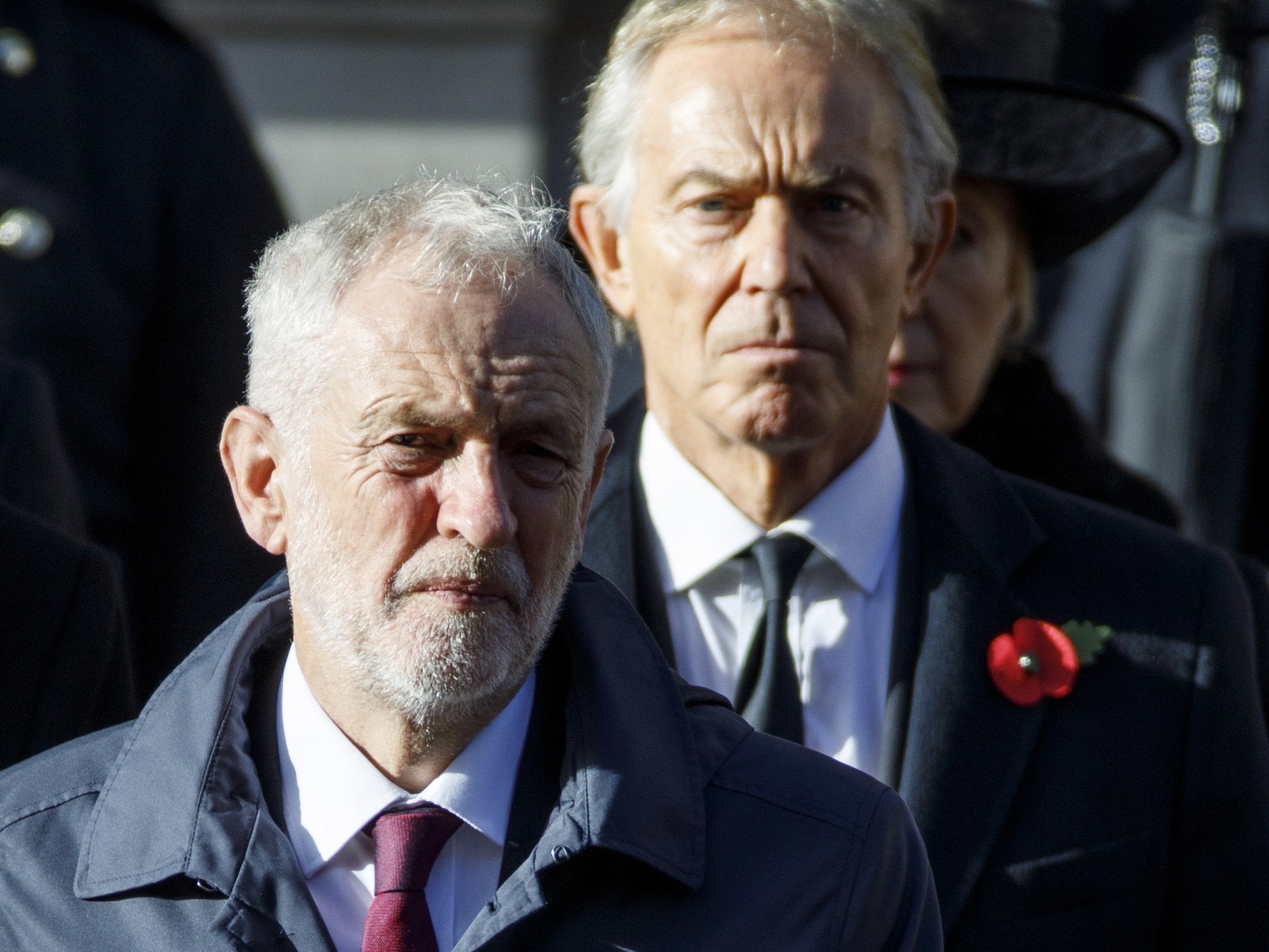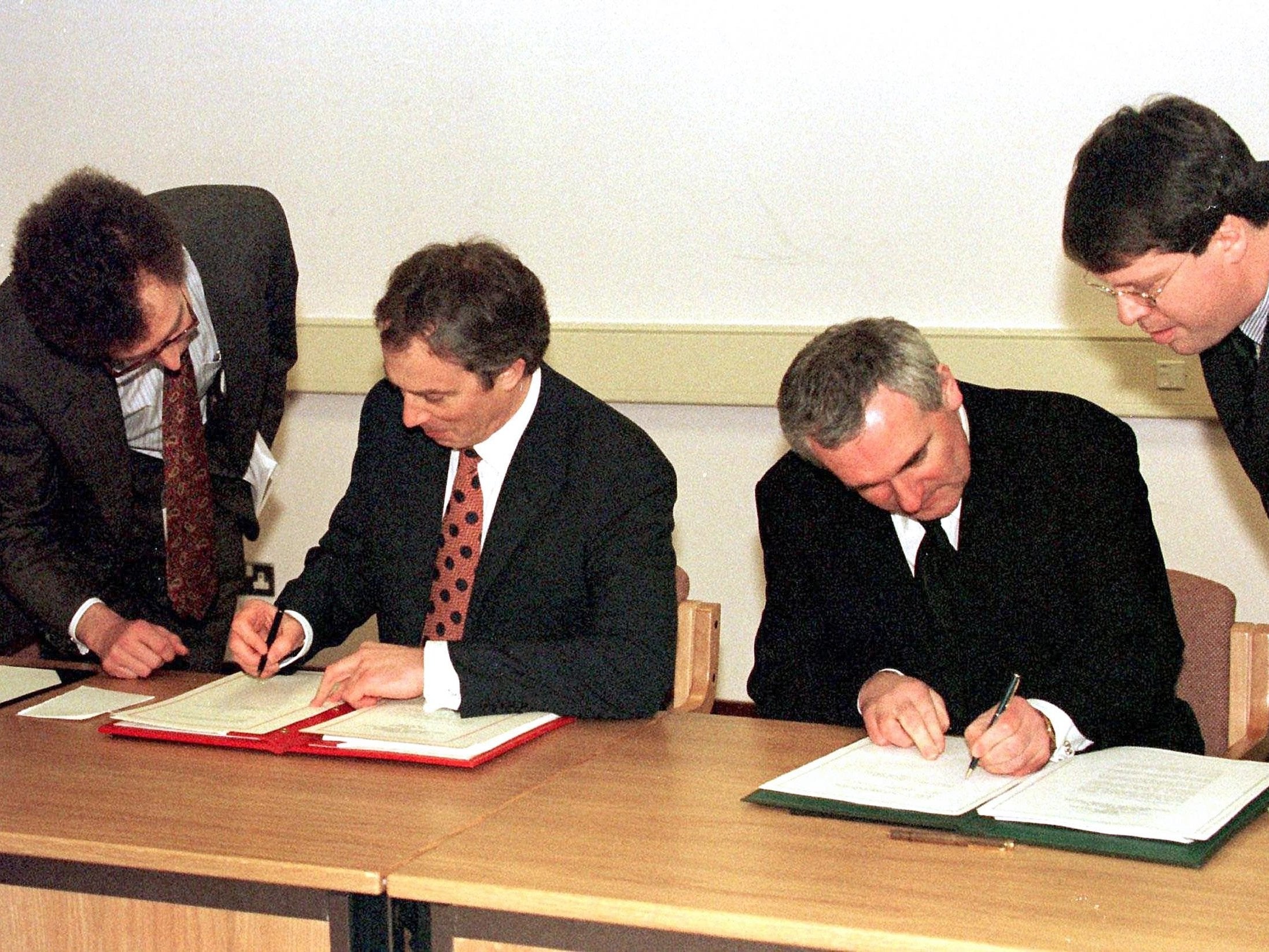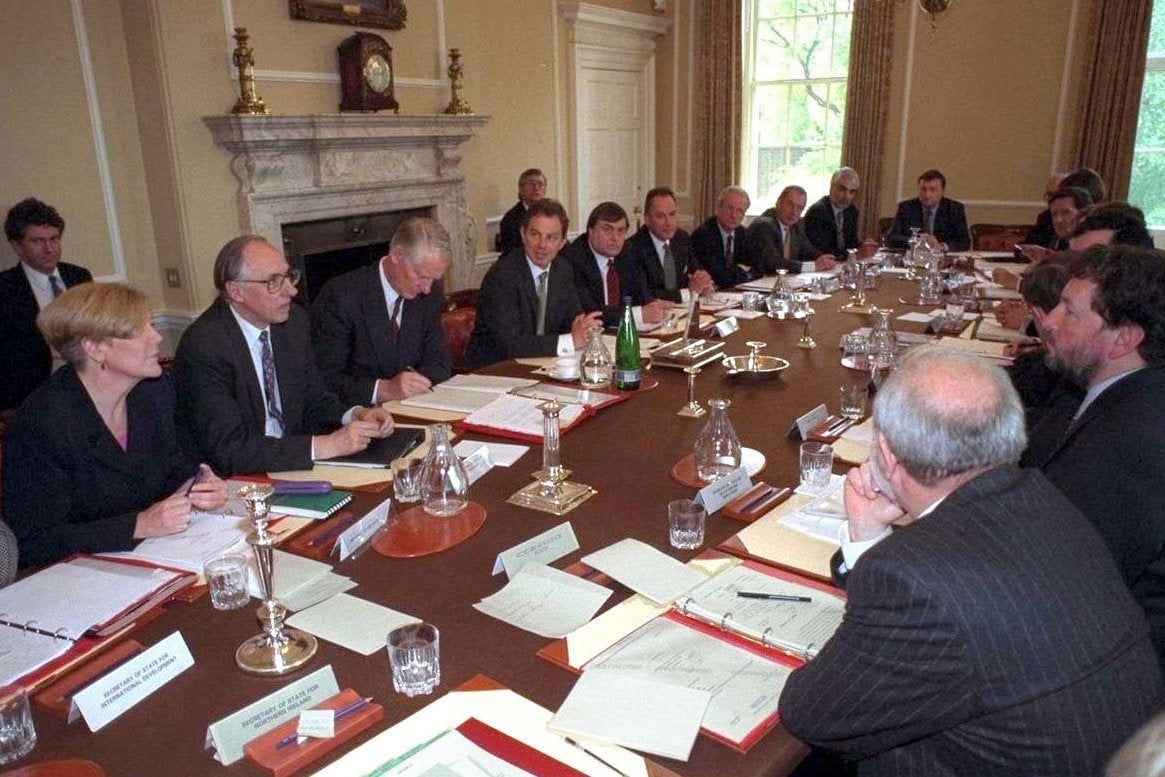History ought to take a more balanced view of Tony Blair’s record as prime minister
In this extract from their new book, Jon Davis and John Rentoul, who teach a course in The Blair Years at King’s College London, argue that many of the criticisms of New Labour in government are unfounded


It is often said of an unpopular politician that history will be kinder to them. For some time we assumed that this would be true of Tony Blair, but it is now apparent that such a verdict will not be clear-cut. Will posterity see him as brilliant? Probably. Will it see him as tricky? Also likely. But will the overall verdict be positive or negative? We are not sure. As prime minister, he was popular enough to stay in office for 10 years and to leave pretty much on a date of his own choosing.
Since then, however, his reputation has failed to recover, as the Iraq war, the financial crisis and immigration became the dominant themes of his record. Although Blair won the 2005 election two years after the invasion of Iraq, the belief that he deceived parliament and the nation in making the case for the invasion has become firmly established. The financial crash of 2008 has cast a shadow over the golden economic record of the previous decade. And, as the free movement of workers became the focus of the campaign to leave the European Union, Blair’s decision to allow the citizens of new member states to come to the UK from 2004 without the delay imposed by Germany and France has often been cited as a reason for the vote to leave the EU in the 2016 referendum.
We had thought, all the same, that a more balanced assessment of the Blair period would assert itself in time. Instead, history became less kind to him. When Robert Tombs’s bestselling The English and Their History was published in 2014, it repeated all the negative readings of the country’s most recent period. New Labour, Tombs said, was “authoritarian”; it was too attentive to the rich in general and to Rupert Murdoch in particular; it was responsible for “bypassing parliament”, “subverting normal administrative methods (such as taking minutes of meetings), and tending to politicise or bypass civil servants”; it used the press as an “instrument of politics” and was guilty of “spin”; and it achieved a settlement in Northern Ireland only at “a cost”.
The election of Jeremy Corbyn as Labour leader in 2015 completed a process of reaction against Blair’s politics within the Labour Party that took elements of all these criticisms and added to them the charge that he had continued Thatcher’s policy of venerating the market and of “privatising” public services.
The EU referendum in June 2016 suggested that Blair’s Europe policy had been a failure. Whatever the complex reasons for first holding the referendum and then for the result, the outcome was a repudiation of Blair’s ambition 19 years earlier to “put Britain at the heart of Europe”. To the extent that the vote was read as a rejection of the free movement of people, it was also seen as confirming the error of Blair’s policy on immigration. The publication of the Chilcot report two weeks later, and particularly the reporting of it as confirming that Blair had lied, even though it specifically but unobtrusively absolved him of that charge, further suggested that our expectation was premature.
The case for the defence
Let us try to summarise our conclusions about these criticisms in turn.
Our view is that the decision to join the American invasion of Iraq was a complicated one, where no decision would have been in effect a decision in itself. The decision to take part was made for good reasons on the evidence available at the time, but where Blair erred was not so much in failing to probe the intelligence provided to him about weapons of mass destruction but in failing to give enough weight to the risk of sectarian bloodshed as a consequence of toppling Saddam Hussein. It seemed reasonable to suppose that disarming Saddam, which probably meant in practice removing him, was a worthwhile object in itself; but the possible consequences should have outweighed that judgement. They were foreseeable and should have been foreseen, as the Chilcot inquiry found. It would have been hard for a pro-US government such as Blair’s to have stood aside, but that was the test.

Nor should Iraq be allowed to eclipse all of Blair’s foreign policy. The creation of the Department for International Development and the progress towards the target of 0.7 per cent of national income being spent on aid – it rose from 0.26 per cent in 1997 to 0.57 per cent in 2010 before finally reaching 0.7 per cent under David Cameron in 2013 – were substantial achievements. The rescue of the Muslims of Kosovo from the attempted “ethnic cleansing” of Slobodan Milosevic, and of the (mostly Muslim) people of Sierra Leone from the murderous hand-choppers of the Revolutionary United Front were unarguable credits in the ledger of history. The intervention in Afghanistan – while widely accepted as justified initially, except by Jeremy Corbyn, who founded the Stop the War coalition to oppose it – produced mixed results. Life expectancy and the proportion of girls in education rose, but the task of suppressing the Taliban was misconceived, and Blair agreed to a US request, supported by John Reid, defence secretary, and the army, for UK troops to take over the deadliest province, Helmand, in 2006. It was not until 2014 that UK combat troops were finally withdrawn.
On the economy, our view is that the New Labour record was good overall. Despite the foolish rhetoric of “no more boom and bust”, a phrase used by both Brown and Blair, the economic cycle had not been abolished, and when the recession came it came in a form that had not been widely expected: a credit crunch in the banks. Even then, after 16 years of unbroken growth, 11 of them under New Labour, there were two things in New Labour’s favour, and both of them were thanks to Gordon Brown. Brown’s reforms of the labour market, and in particular the tax credits that Blair disliked, meant that the 2008 recession, deep though it was, caused a surprisingly small rise in unemployment – and employment recovered quickly thereafter. Secondly, Brown himself was a good person to have in charge in that crisis, in that he understood both the economics and the geopolitics behind the economics. He realised the importance of coordinated government action to sustain demand, rallying the larger group of G20 countries (rather than the G7) to keep the world economy afloat. He had the good judgement and the authority to ignore David Cameron and George Osborne who were against nationalising banks (however much he too had initially tried to avoid it) and opposed to the large increase in public borrowing – two policies that helped stave off a serious depression.

Even after the crash, real national income per head was 17 per cent higher in 2010 than it had been in 1997 – a modest gain but a better record than in the US, Germany, France, Japan and Italy. As for the distribution of income and wealth, Peter Mandelson’s much-quoted claim to be “intensely relaxed about people becoming filthy rich” is often quoted without the second half of the sentence, “provided they pay their taxes”. New Labour managed an economy that was rich enough to afford renovations of the public services, particularly health and education, and to prevent inequality from rising. The national minimum wage, tax credits and rising employment were all important. The failure to narrow the gap between rich and poor disappointed rigorous egalitarians – that is, most of the Labour Party – but it is hard to see how much more could have been done in an open economy, while maintaining a viable electoral coalition.
That open economy meant immigration, on which the verdict of history will probably depend on the jury’s prior assumptions. The European single market, legislated for by Thatcher, and its opening up, driven forward under Blair, was good for the British economy, and a factor in turning the UK from the “sick man of Europe” into one of its more dynamic and successful economies. Expanding the EU to the east had long been a strategic objective of British foreign policy, to dilute the German-French domination of the EU and to lock in the democratisation of the former Soviet bloc.
Even the decision not to impose a seven-year delay on the free movement of workers from the new members was uncontroversial at the time. For those who agree with it, it was a brave, principled and liberal decision, but in fact, as Ed Balls told us, “we didn’t see the extent to which low-wage people would move – fundamentally, we didn’t think they would”.

What was surprising about it was that Blair, so sensitive to popular opinion on matters of immigration and asylum, and so able to respond to concerns in the short term, failed to see the longer term problems that were being stored up. Indeed, he turned the immigration issue against Michael Howard in the 2005 election, using it to portray the Conservatives as mean-spirited and backward-looking. So successful was he that David Cameron backed off the subject completely, and it then became a force behind the rise of Nigel Farage’s UK Independence Party and the campaign for a referendum on EU membership.
Immigration undoubtedly contributed to the dynamism of the British economy, and in particular to the success of London as a world city, but the scale of it alarmed people. Net immigration rose above 100,000 a year in 1998, and then above 200,000 a year in 2004, contributing to a feeling among most of the population that they had not been consulted about the country changing in ways that they did not like.
The dynamism of the economy in turn produced the tax revenue that paid for better public services. The criticism from the Corbyn wing of the Labour Party that New Labour was bent on privatisation seems to rest on a confusion. As long as services were free at the point of need, New Labour did not care who provided them: “What matters is what works.” In practice, few NHS services were contracted out: in many cases, the mere possibility of rival providers offering NHS services was enough to change the behaviour of the NHS.
The main change, however, was more public money, with NHS spending doubling in real terms over the New Labour period. Schools were improved, with better pay for teachers, more staff, rigorous national standards for primary school teaching and later the academies and similar reforms to secondary schools. The results were mixed and hard to measure, but a study by the Institute of Education at the University of London of the 1997-2010 record found “there is a broad trend toward small reductions in attainment gaps” between pupils from low- and high-income families. The proportion of young people attending university rose from 39 per cent in 1999 to 46 per cent in 2010, including a greater proportion from lower-income families, under the system of student loans repayable after graduation.

Finally, it is worth paying some attention to one of Blair’s least-contested achievements in government, the settlement in Northern Ireland. The breakthrough in principle occurred in the Belfast Agreement of 1998, and it was secured in practice in the St Andrews Agreement of 2007, under which the Democratic Unionist Party, by then the largest party on the unionist side, and Sinn Fein, the largest party on the nationalist side, formed a joint devolved administration.
Jonathan Powell, Blair’s chief of staff, played a central role as a fixer endowed with the prime minister’s personal authority. When he came to talk to our class in 2009, he warned against the tendency to go from thinking the problem was “insoluble before it got solved” to it being “inevitable that it was going to get solved” once it had been.
After nearly 10 years of devolved administration, the Northern Irish government collapsed in 2017, and the situation was complicated by Theresa May’s need for DUP votes at Westminster after the 2017 UK election, and by the Brexit negotiations. However, at the risk of sunny optimism, it seems that a resumption of pre-1998 levels of violence is unlikely.
Sofa government
As was inevitable with any government impatient to make changes, Blair’s was criticised for the way it made decisions. He was accused of excessive prime ministerial power, riding roughshod over collective cabinet decision-making and excessive informality – a welter of complaints summed up in the phrase “sofa government”. Once these criticisms are broken down into their constituent parts, however, we believe most of them to be unfounded. It was certainly true, as most of our witnesses testified, that power in the Blair government was concentrated in the Blair-Brown axis.

All important decisions were taken by those two, at first in an informal if fraught partnership, later in an increasingly hostile negotiation. That duopoly drew power away from the rest of the cabinet. But to suggest that this was a break from a long tradition of broad-based collective government is unconvincing. Our view is that the waxing and waning of collective decision-making is the product of politics, rather than the determinant of it.
Margaret Thatcher had been criticised as an over-mighty prime minister and praised as a strong one. John Major was praised for his more consensual style and criticised for his weakness. In the previous Labour government, James Callaghan used long cabinet meetings to try to wear his colleagues down into a common position, a need forced on him as he lost his parliamentary majority.
The allegation of spin was a tribute to Campbell’s energy and discipline in opposition, but it was also, perhaps, the inevitable product of the scale of Blair’s election victory, which raised expectations that would be impossible to fulfil
One of the most striking vindications of Blair’s governing style, paradoxically, came from Gordon Brown, who admitted in his memoir that he tried to “move on” from “sofa” government and to restore a traditional form of cabinet rule, but that he had to accept that times and the media environment in particular had changed.
As for the charge echoed by Tombs that New Labour subverted “normal administrative methods … such as taking minutes of meetings”, this may reflect two things. In the first few days after the 1997 election there was some confusion about unminuted meetings – between Blair and Brown, naturally – as they carried the working style of opposition into government. This was quickly formalised.
Procedures were changing fast with the use of email and texts, although they did not seem to become a problem for the bureaucracy until the arrival of Brown as prime minister, with his more disorganised methods. The other source of the idea that New Labour was cavalier about record-keeping was the comment by the Butler inquiry into the intelligence case for the Iraq war about the “the informality and circumscribed character of the government’s procedures”. However, the idea that decisions might have been different if more “traditional” procedures had been followed is unconvincing. Neither the Butler nor the Chilcot report contains any evidence to suggest that different procedures would have led to a decision to stand aside from the US-led military action.

Much the same can be said of the complaint that New Labour politicised the civil service. Again and again this was rebutted by the officials who came to talk to our seminars. They all welcomed political advisers, now universally known as special advisers, as providing additional political capacity at the top of government and, paradoxically for some, a bulwark against politicisation. In a democracy, parties are elected to carry out their programme, and an effective government needs a politically committed team to drive it forward. Many civil servants had criticisms of special advisers – primarily of their sometimes excessive loyalty to an individual politician, or to either the Blairite or Brownite factions.
If there was too much faction-fighting in New Labour, however, the main causes were Blair and Brown’s dysfunctional relationship and the weakness, before 2005, of the opposition Conservative Party, rather than an excess of special advisers. As with the supposed downplaying of cabinet government, one of the tests of this criticism is what the coalition did next. While the number of special advisers rose from 38 under John Major to a peak of 84 under Gordon Brown, it then rose further, to 107, under the coalition. Nick Clegg in particular felt forced by his situation to reverse his feisty pre-election rhetoric against New Labour’s special advisers to hire 15 “spads” for his office of deputy prime minister alone.
Blair’s decision to put a political chief of staff, Jonathan Powell, at the heart of the Downing Street operation with formal power to direct officials was an interesting one and something that took time to settle, but eventually Powell worked well alongside the civil service linchpins, the principal private secretary and the cabinet secretary. This was reversed, unreversed and reversed again by Gordon Brown, but under David Cameron and Theresa May the idea of a political chief of staff has become established.

As for the charge that New Labour was too reliant on spin and media manipulation, it contains its own refutation. For a government to acquire a reputation for spin – that is, for not being straight with people – is evidence that it is bad at the art of presentation. Indeed, the Labour government found itself at an early stage, before 2000, trapped in a cycle of trying to shake off this reputation, with each attempt being seized on by journalists as evidence of further manipulation. Thus Alastair Campbell put briefings of Westminster journalists on the record and instituted monthly televised news conferences with Blair himself. But once the virus of the charge of spin had entered the bloodstream of the media-political complex, it could not be expelled. The allegation of spin was a tribute to Campbell’s energy and discipline in opposition, but it was also, perhaps, the inevitable product of the scale of Blair’s election victory in 1997, sustained in 2001, which raised expectations that would be impossible to fulfil.
Those high expectations, which were different and probably incompatible for different voters, were bound to be disappointed. As time went on and Blair’s government took more and more decisions, the probability that one or more sections of the electorate would be offended grew. As people sought to rationalise their past enthusiasm for New Labour, the idea took hold that they had been taken in by the arts of slick presentation, or that decisions with which they disagreed – in some cases after the event – must have been arrived at by bad, politicised or informal procedures.
We argue that such perceptions are ahistorical. We accept that the view in our book is slanted in Blair’s favour. Most of the politicians, special advisers and officials who came to our classes were proud of their collective record. However, in our opinion the prevailing view of Blair and New Labour is too negative, and it is one of our purposes to provide a counterweight, so that the independent-minded reader is better placed to reach a considered view.
‘Heroes or Villains? The Blair Government Reconsidered’, by Jon Davis and John Rentoul, is published by Oxford University Press on 14 March
Join our commenting forum
Join thought-provoking conversations, follow other Independent readers and see their replies
Comments